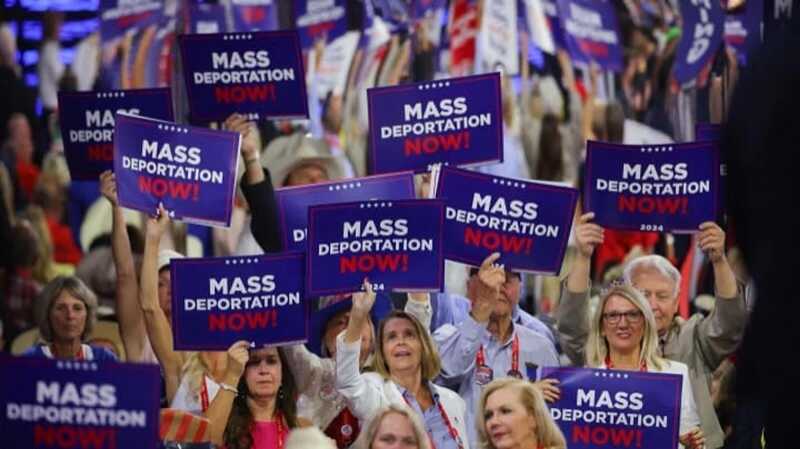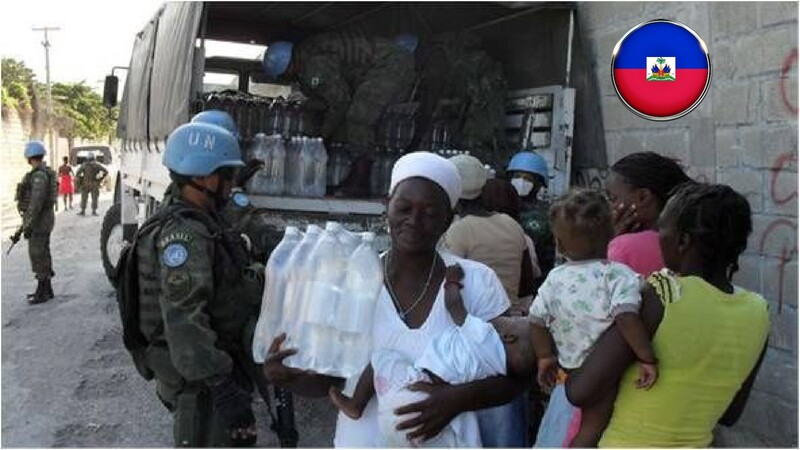 Protesters in the U.S. holding placards showing their objection against mass deportation. Photo Credits: Zachary Mueller via Substack
Protesters in the U.S. holding placards showing their objection against mass deportation. Photo Credits: Zachary Mueller via Substack
Us Alteration Of Immigration And Deportation Policies: Complexities On Rushed Us Mass Deportation And Human Rights Concerns
For a long time, the United States has been recognized as a country of law and order, where every individual feels secure and protected. The U.S. has upheld a legal commitment to humanity and human rights. However, in 2025, this narrative shifted due to policies introduced by the Trump administration, transitioning from a sanctuary to a scrutinized space marked by deportation practices and an erosion of humanity.
Executive Orders and the Erosion of Human Rights
The United States has violated its own laws and human rights obligations in an attempt to reclaim its perceived superiority through President Trump's executive orders. During his campaign, President Trump expressed his intention to curb illegal immigration to the U.S. Historically, the U.S. has welcomed immigrants and established legal procedures for migration and citizenship acquisition. Among these avenues, the Diversity Immigrant Visa (DV), introduced in 1990 as part of the Immigration Act, was a gesture of goodwill to accommodate people from diverse nationalities, races, and backgrounds.
A Changing Landscape for Immigrants
The U.S. has long been a favored destination for immigrants due to its diversity, vast opportunities, strong economy, education system, and healthcare. However, recent events have sparked global conversations and instilled fear among immigrants. President Trump has initiated mass deportations of illegal immigrants and enhanced border security to curb unauthorized migration. These changes in immigration and deportation laws have faced criticism for their aggression and legal inconsistencies.
Controversial Deportation Practices
Recent incidents include the revocation of legal status for half a million migrants from Cuba, Haiti, and Venezuela, the deportation of green card holders and international groups with political affiliations, and erroneous deportations. These controversies undermine existing laws and policies, altering them to align with the current administration's interests. For instance, deporting individuals who obtained green cards under the Immigration Act of 1990 conflicts with the government's obligation to uphold its own laws.
Legal and Human Rights Concerns
Deportation practices have come under scrutiny for their conduct, sparking outrage among human rights and civil liberties groups. Deportation has led to complex legal battles due to the lack of a clear framework addressing its repercussions. Many question President Trump's motivations for rushing such a sensitive issue and his regard for humanity and human rights. On April 1st, the New York Times reported on a man who, due to an "administrative error," was deported despite living legally in the U.S. He ended up in a terrorism confinement center. The U.S. had a legal obligation to protect him, but the haste to eliminate immigrants exposed his life to danger.
Discriminatory Practices and Judicial Intervention
Mr. Abrego Garcia, who had sought asylum in the U.S., was protected under the Alien Enemy Act. While the government acknowledged its error, it argued that little could be done after the fact. From a human rights perspective, the issue was not his legality but his nationality. If Abrego had been a U.S. citizen, he would not have faced such exposure. Deportation, therefore, appears to be more of a discriminatory practice aimed at eliminating immigrants. In response to these practices, District Judge Murphy issued a restraining order against the fast-tracking of deportations for individuals from third-world countries, ensuring they have the opportunity to claim persecution or torture. The judge cited the Convention Against Torture as a legal basis for protecting immigrants.
The Need for Balanced Immigration Policies
President Trump's executive orders on systemic detention and deportation have instilled fear among immigrants and their families. The changes in U.S. immigration and deportation policies have sparked critical legal battles and international human rights concerns. While addressing illegal immigration is necessary, the administration must avoid violating human rights. Upholding the sanctity of life should take precedence over all other demands. Before deporting individuals, the administration must evaluate the complexities of each case. As policies continue to evolve, it is imperative to adhere to existing laws and international human rights standards.
Executive Orders and the Erosion of Human Rights
The United States has violated its own laws and human rights obligations in an attempt to reclaim its perceived superiority through President Trump's executive orders. During his campaign, President Trump expressed his intention to curb illegal immigration to the U.S. Historically, the U.S. has welcomed immigrants and established legal procedures for migration and citizenship acquisition. Among these avenues, the Diversity Immigrant Visa (DV), introduced in 1990 as part of the Immigration Act, was a gesture of goodwill to accommodate people from diverse nationalities, races, and backgrounds.
A Changing Landscape for Immigrants
The U.S. has long been a favored destination for immigrants due to its diversity, vast opportunities, strong economy, education system, and healthcare. However, recent events have sparked global conversations and instilled fear among immigrants. President Trump has initiated mass deportations of illegal immigrants and enhanced border security to curb unauthorized migration. These changes in immigration and deportation laws have faced criticism for their aggression and legal inconsistencies.
Controversial Deportation Practices
Recent incidents include the revocation of legal status for half a million migrants from Cuba, Haiti, and Venezuela, the deportation of green card holders and international groups with political affiliations, and erroneous deportations. These controversies undermine existing laws and policies, altering them to align with the current administration's interests. For instance, deporting individuals who obtained green cards under the Immigration Act of 1990 conflicts with the government's obligation to uphold its own laws.
Legal and Human Rights Concerns
Deportation practices have come under scrutiny for their conduct, sparking outrage among human rights and civil liberties groups. Deportation has led to complex legal battles due to the lack of a clear framework addressing its repercussions. Many question President Trump's motivations for rushing such a sensitive issue and his regard for humanity and human rights. On April 1st, the New York Times reported on a man who, due to an "administrative error," was deported despite living legally in the U.S. He ended up in a terrorism confinement center. The U.S. had a legal obligation to protect him, but the haste to eliminate immigrants exposed his life to danger.
Discriminatory Practices and Judicial Intervention
Mr. Abrego Garcia, who had sought asylum in the U.S., was protected under the Alien Enemy Act. While the government acknowledged its error, it argued that little could be done after the fact. From a human rights perspective, the issue was not his legality but his nationality. If Abrego had been a U.S. citizen, he would not have faced such exposure. Deportation, therefore, appears to be more of a discriminatory practice aimed at eliminating immigrants. In response to these practices, District Judge Murphy issued a restraining order against the fast-tracking of deportations for individuals from third-world countries, ensuring they have the opportunity to claim persecution or torture. The judge cited the Convention Against Torture as a legal basis for protecting immigrants.
The Need for Balanced Immigration Policies
President Trump's executive orders on systemic detention and deportation have instilled fear among immigrants and their families. The changes in U.S. immigration and deportation policies have sparked critical legal battles and international human rights concerns. While addressing illegal immigration is necessary, the administration must avoid violating human rights. Upholding the sanctity of life should take precedence over all other demands. Before deporting individuals, the administration must evaluate the complexities of each case. As policies continue to evolve, it is imperative to adhere to existing laws and international human rights standards.
Senior Editor: Kenneth Njoroge
Financial Expert/Bsc. Commerce/CPA
